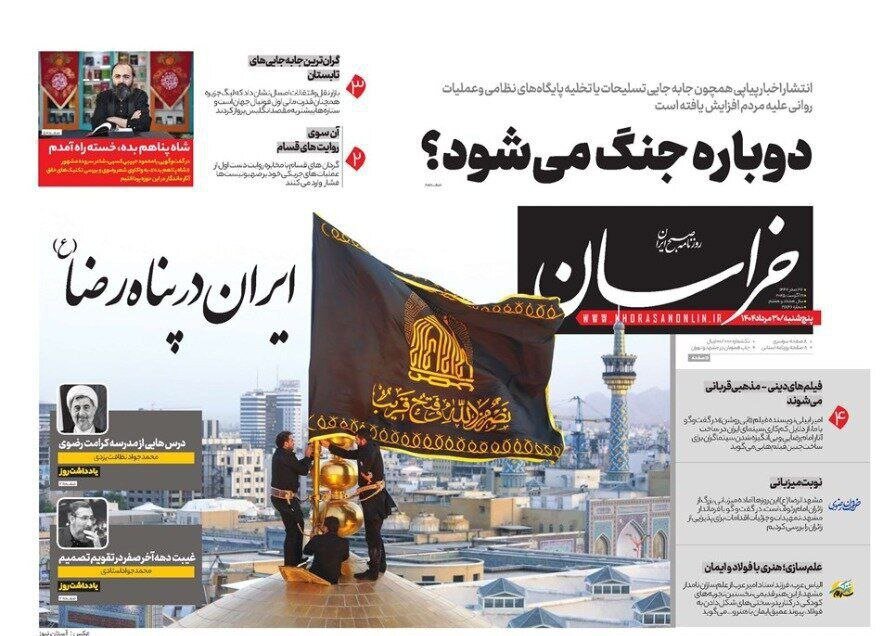Will there be another war?

Khorasan raised a question whether the war between Iran and Israel will be resumed after a lull. It said: There are scattered reports about the end of the temporary ceasefire and the imminent resumption of war between Iran and the Zionist regime, but we must first distinguish between possibility and probability.
The possibility of returning to direct war between Iran and Israel is always on the table, but the probability of it occurring in the short term is not very high. Because a new balance of deterrence has been formed after the 12-day war, forcing both sides to reassess the costs and benefits of each action. In this balance, an immediate return to full-scale war has given way to a more likely scenario, which is the continuation of the conflict in the form of a “shadow war”, limited strikes, and the field of competition has become more multilayered. Many imagine that the ceasefire was the product of one side’s incompetence or complete defeat, while the reality is more complex. The end of the war was the result of a careful calculation by both sides. Both sides realized that they were at a point where the marginal cost of a further attack far outweighed its potential benefits. This is the logic of mutual deterrence that still holds today. As long as this calculation holds, the threshold from shadow war to direct war will remain high.
Shargh: Tehran's mistrust of IAEA
Shargh wrote about the main causes of Iran's dispute with the International Atomic Energy Agency and said: One of the main causes of Iran's dispute with the Agency is that the institution is not neutral. The Agency's silence in the face of direct U.S. and Israeli attacks on Iran's nuclear facilities, which were under strict supervision, not only severely damaged Tehran's trust but also paved the way for Iran to reconsider the level of cooperation. Iranian officials have repeatedly emphasized the continuation of this biased trend could limit or even stop technical cooperation with the Agency. Tehran recently began negotiations with the Agency to define a new framework for cooperation, and as long as the country's security and rights are not guaranteed, it cannot be the same as in the past. From Iran's point of view, the main problem lies in the Agency's political and biased behavior. The visit of Agency officials to Washington cannot be considered a mere technical measure. This trip takes place in an environment where mutual trust between Tehran and the IAEA is at its lowest level, and any overt convergence of the IAEA with the United States could exacerbate this distrust and negatively impact the ongoing negotiations.
Etemad: Difficult conditions after snapback
Etemad discussed the possible activation of snapback mechanism and its consequences with Dr. Gholamreza Karimi, a professor of international relations. He said: If the snapback mechanism is triggered, the level of distrust between the parties will increase sharply. Iran will probably respond to this action by withdrawing from the NPT or at least reducing the International Atomic Energy Agency’s inspections. This will intensify the distrust of Western countries towards Iran and increase the opportunity for building an international consensus against Iran, especially through the issuance of a resolution by the IAEA Board of Governors and referring the issue to the Security Council. Although divisions within the Security Council make the adoption of a new resolution against Iran unlikely, the reinstatement of sanctions from previous resolutions and Iran’s potential placement under Chapter VII of the UN Charter would significantly worsen its situation. This situation, given the current multiple internal crises, makes normalizing Iran’s case extremely complicated and will likely lead to an escalation of tensions between the two sides.
Siasat-e-Rooz: Powerful Iran
Siasat-e-Rooz discussed Iran's military approach in a note and said: Situated in a geopolitically sensitive region and facing security and terrorist threats from multiple fronts, Iran—targeted by hegemonic powers seeking its disintegration—undeniably requires strong military and defensive capabilities. The United States and the Zionist regime, along with some European countries, are relying on the tools of terrorism and regional factors, and even direct military attacks, to trigger civil war and ultimately disintegrate Iran. The truth is that today's world no longer values diplomacy, and negotiation without the tools of power means surrender. The experience of the 12-day imposed war showed that the enemy, under the guise of diplomacy, is preparing for war, massacre, and the disintegration of Iran, and diplomacy and negotiation do not work. Certainly, if it were not for the missile and drone capabilities of the armed forces, the United States and the Zionist regime would have never agreed to a ceasefire. Today, what determines Iran's deterrence against any aggression is solely its indigenous military capabilities, which must be taken with authority to realize.
Leave a Comment